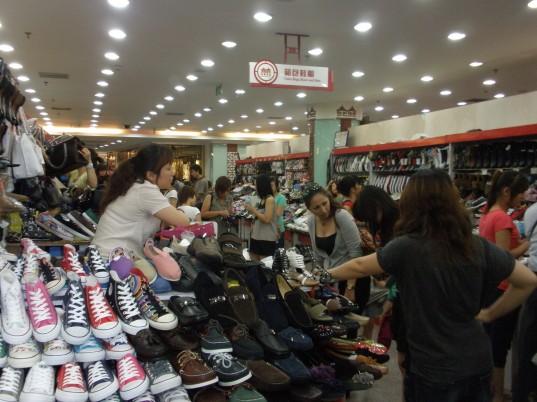A lot of people claim to have a black belt in shopping. If you are one of them, I hereby challenge you to a match; the battleground can be any Chinese market. Don’t worry, we´ll not fight against each other, God forbid—we are on the same team! This match pits buyers against sellers. Very smart, clever and bright young sellers who know exactly how to make us pay waaay more than we should. That’s why we need to team up and let them know they are not dealing with amateurs.

How do you win in shopping? By being the best to bargain, of course! Except for the chain stores and a few for-real-price-tag shops, most items in China can be bought at a much lower cost than the initial price. You might think, oh, it’s so cheap anyway, but that is not the point. You. Must. Always. Bargain.
So how do you become a winner? By using these very simple and workable methods:
Do your Research
Find out what other people are paying. Listen in on negotiations. Stop other tourists and ask. Talk to people you meet. You’ll most likely hear a lot of excuses from people who think they should have paid less. Other people will be more than happy to brag and share. Calculate an average price, and make your opening bid a lot lower, because the game is all about give and take.
Buy More
The price per item will go down if you buy more. They say one sweater for 70, you say two for 50. And there you go. But don’t lose your head; think through if you actually need 15 pairs of sock or seven identical t-shirts. Another little known, but very effective version of this is to add an extra item instead of asking them to go lower. The necklace is stuck on 100, so then you tell them you can pay that if they include the earrings as well. Voila!
Don’t be Afraid to Walk Away
If you can’t agree on a reasonable price, walk away. Two things will happen: a) they come running after you and give you a lower price. b) They let you walk, even when you walk reeeally slowly. Then you have two options. Turn around and accept their price, or find the exact same thing in another store and start all over. If you yet again get the same price as the first seller you know you most likely have hit bottom.
Be Rude
Sometimes in China being rude is a way of survival (and saving cash). Walking around the busy shopping areas can be an attack on all the senses, and people will do anything to get your attention. As soon as they have your attention, you will probably end up buying something. Especially if you are already worn down by the heat, noise and visual impact. You handle this by overlooking the sellers completely. Look at the items only, don’t make any eye contact and ignore anyone talking to you. Don’t ask about the price until you are sure you will consider buying it. It can be hard at first, but practice is the key. It sounds cruel, but they are used to being ignored, it is part of the game. If you find something you like your start the process or you say a friendly, “Bye-Bye,” and move on.
Have Fun
Chinese sellers don’t rip you off to be mean; they just take advantage if you haven’t done your homework. When you know what the stuff is actually worth, you’ll see the prices drop dramatically, without the sellers being too concerned. If you interact in a friendly and polite manner, that is. They might accept that they get ignored, but no one likes to be yelled at or threatened. By all means, overplay your emotions, you can be as dramatic as you want, but instead of anger, feign surprise, hurt or disbelief. It’s after all a play, it’s supposed to be emotional. Go for an Oscar or stay at home!
Bring a Friend
Play good buyer/bad buyer, where one is interested and the other tries to convince the friend the price is too high and wants to leave. Works well if you don’t speak English also, the sellers get the tone of the conversation. And don’t get surprised if they understand your mother tongue, they are so clever and pick up a lot from talking to tourists all day.
You know that if you agree after 10 minutes of hard bargaining, and they still call you friend and tell you to come by next time, you both did a good deal, which is after all the goal of all this nonsense.
So why should you bargain even when it is so cheap? Because if you don’t, you ruin it for everybody else who doesn’t think it is so cheap. All the things they sell are overpriced, because they expect you to bargain for it. It’s not that I don’t want the sellers to make money, of course they should, but even when you bargain half the price, they still do.





[…] Now, how much you end up paying for things in China, really comes down to how well you bargain! If you want to master the art of bargaining in China, you can start your lessons here! […]
It takes time to get used to, but a lot of fun when you start to master the skill 🙂
This is very interesting! I sent it to a friend that is traveling to China in October. Here in Iceland nobody bargains its so weird!
This is GREAT!! I could write a similar one for Egypt 🙂 .. thanks for sharing this!